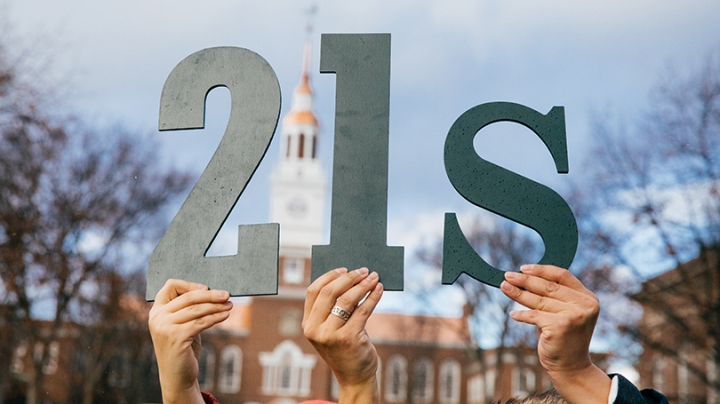Dartmouth has offered 2,092 students admission to the Class of 2021, the most academically accomplished and globally diverse class the College has ever accepted.
Students who applied through the regular decision process were able to see their admission decisions today at 5 p.m. on a secure website hosted by the Office of Admissions.
“This is a really dynamic group of students,” says Lee Coffin, dean of admissions and financial aid. “They are intellectually engaged, curious, adventuresome, kind, and imaginative, and they will be a tremendous addition to the Dartmouth community.”
Coffin says that the accepted students represent one of the strongest academic profiles the College has admitted. Of those from schools that rank, 96 percent are expected to graduate among the top 10 percent of their high school class. That group includes 547 students who are currently ranked as the valedictorian or salutatorian of their class, a 25 percent increase over last year and an all-time high. Forty-six percent of the valedictorians and salutatorians are students of color and another 13 percent are foreign citizens. Mean SAT scores rose 17 points over last year’s accepted students, to an all-time high of 1495, while the ACT mean remained at 33.
The current acceptance rate, from a pool of 20,034, is 10.4 percent, making this Dartmouth’s most selective admissions cycle since 2013.
Fifty-nine percent of the accepted students attend a public or charter high school; 28 percent attend an independent school; 10 percent are enrolled in a religiously affiliated school; and 3 percent attend schools of unknown affiliation outside the U.S.
The accepted students come from all 50 states and Washington, D.C., and also from American Samoa, Puerto Rico and the Mariana Islands. For the sixth year in a row, California leads all other states followed by New York, Massachusetts, Connecticut, and Florida. Forty-seven residents of New Hampshire, up from 35 last year, are among those who have been accepted.
The global dimension of the accepted class marks a significant shift in demographics. There are 255 accepted students from 63 foreign countries, a 38 percent increase over the Class of 2020, representing the largest cohort ever from outside the United States. Foreign citizens represent 11 percent of the accepted class, up from 8 percent last year. Almost half of the accepted foreign students will be offered need-based financial aid.
Residents of the United Kingdom, Canada, and South Korea represent the largest foreign contingents in the accepted class, which also includes students from Argentina, Croatia, Iraq, Kosovo, Sweden, Tunisia, the United Arab Emirates, and Vietnam—a few of the nations that have been less frequently represented in past years.
“Accepting, and hopefully enrolling, more students from around the world is sure to complement the College’s global outlook and curriculum,” says Coffin.
Other demographic highlights include:
- 51 percent of accepted U.S. citizens and permanent residents are students of color
- 9 percent are the children of Dartmouth undergraduate alumni
- 15 percent are first-generation college bound
- 10 percent are recruited athletes
- Engineering, economics, biology, government/international relations, and English are the most popular anticipated majors
Sixty-three percent of accepted students applied for need-based financial aid, up from 60 percent last year, and the College expects to offer more than $27 million in scholarships to the next first-year class. Preliminary data indicate the average need-based grant is $46,237 and at least 15 percent of the accepted students are Pell Grant recipients.
The total number of accepted applicants includes 550 students who received word of their acceptance in December through the College’s early decision process. These include 26 who were admitted through Dartmouth’s partnership with QuestBridge, a national access organization that helps identify talented students from low-income backgrounds and match them with top colleges and universities. An additional 65 Quest Bridge candidates are among those admitted during the regular decision round. The class also will include 10 military veterans admitted through Dartmouth’s affiliation with the Posse Foundation.
In the coming weeks, prospective students are invited to learn more about the Dartmouth experience. On campus, the admissions office will host two Dimensions of Dartmouth programs for admitted students, scheduled for April 13 and 14, and April 24 and 25. The College will also host a number of off-campus events in conjunction with alumni volunteers around the country and the world.

